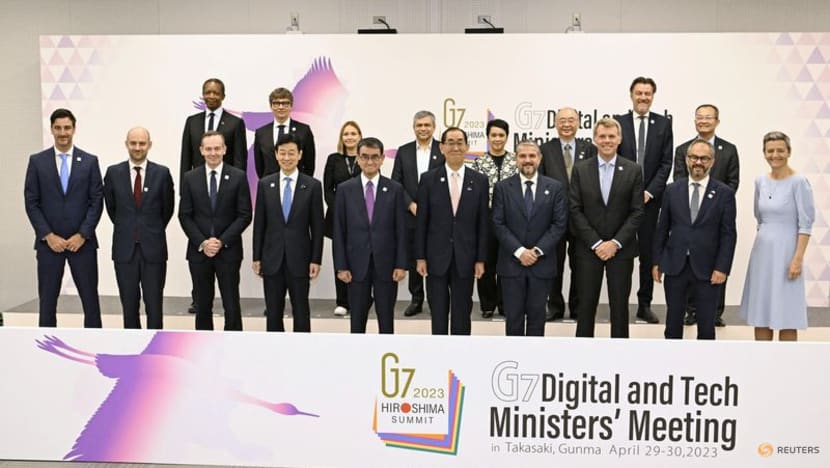G7 should adopt 'risk-based' AI regulation, ministers say

Digital and technology ministers attend a photo session during the G7 Digital and Tech Ministers' Meeting in Takasaki, Gunma Prefecture, Japan, on April 29, 2023, in this photo taken by Kyodo. Mandatory credit Kyodo via REUTERS
TAKASAKI: Group of Seven advanced nations should adopt "risk-based" regulation on artificial intelligence, their digital ministers agreed on Sunday (Apr 30), as European lawmakers hurry to introduce an AI Act to enforce rules on emerging tools such as ChatGPT.
But such regulation should also "preserve an open and enabling environment" for the development of AI technologies and be based on democratic values, G7 ministers said in a joint statement issued at the end of a two-day meeting in Japan.
While the ministers recognised that "policy instruments to achieve the common vision and goal of trustworthy AI may vary across G7 members", the agreement sets a landmark for how major countries govern AI amid privacy concerns and security risks.
"The conclusions of this G7 meeting show that we are definitely not alone in this," European Commission Executive Vice President Margrethe Vestager told Reuters ahead of the agreement.
Governments have especially paid attention to the popularity of generative AI tools such as ChatGPT, a chatbot developed by Microsoft Corp-backed OpenAI that has become the fastest-growing app in history since its November launch.
"We plan to convene future G7 discussions on generative AI which could include topics such as governance, how to safeguard intellectual property rights including copyright, promote transparency, address disinformation" including information manipulation by foreign forces, the ministerial statement said.
Italy, a G7 member, took ChatGPT offline last month to investigate its potential breach of personal data rules. While Italy lifted the ban on Friday, the move has inspired fellow European privacy regulators to launch probes.
EU lawmakers on Thursday reached a preliminary agreement on a new draft of its upcoming AI Act, including copyright protection measures for generative AI, following a call for world leaders to convene a summit to control such technology.
Vestager, EU's tech regulation chief, said the bloc "will have the political agreement this year" on the AI copyright legislation, such as labelling obligations for AI-generated images or music.
Japan, this year's chair of G7, meanwhile, has taken an accommodative approach on AI developers, pledging support for public and industrial adoption of AI.
Japan hoped to get the G7 "to agree on agile or flexible governance, rather than preemptive, catch-all regulation" over AI technology, industry minister Yasutoshi Nishimura said on Friday ahead of the ministerial talks.
"Pausing (AI development) is not the right response - innovation should keep developing but within certain guardrails that democracies have to set," Jean-Noel Barrot, French Minister for Digital Transition, told Reuters, adding France will provide some exceptions to small AI developers under the upcoming EU regulation.
Besides intellectual property concerns, G7 countries recognised security risks. "Generative AI ... produces fake news and disruptive solutions to the society if the data it's based is fake," Japanese digital minister Taro Kono told a press conference after the agreement.
The top tech officials from G7 - Britain, Canada, the EU, France, Germany, Italy, Japan and the United States - met in Takasaki, a city about 100km northwest of Tokyo, following energy and foreign ministers' meetings this month.
Japan will host the G7 Summit in Hiroshima in late May, where Prime Minister Fumio Kishida will discuss AI rules with world leaders.










